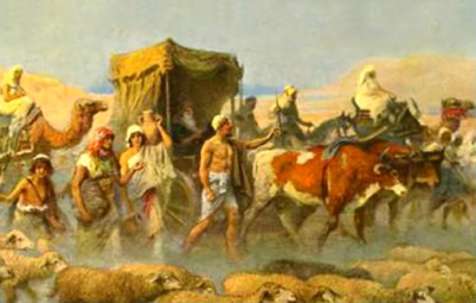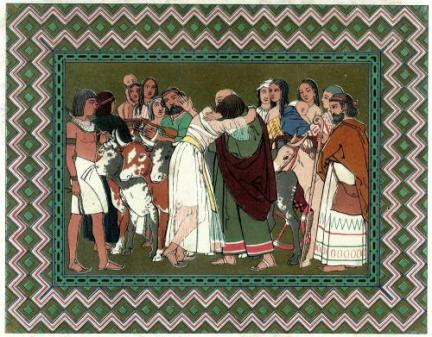More math–Isaac died at 180 (Genesis 35:28). Jacob was 60 years younger, so he was 120 when his father died. If he was about 90 when Joseph was born (Jacob 130 when he met Pharoah, and Joseph nearly 40), then Joseph was actually sold into Egypt before his grandfather Isaac died. The compiler of the story seemed to want to kind of cover Jacob’s journeys first, and then go on with Joseph’s story.
While the family were living in the valley of Hebron (Genesis 37:14) the brothers went to graze the flocks in Shechem, but had moved on to Dothan, possibly not quite 25 miles further north . . . maybe a day’s journey (with a large flock of sheep?). If we divided the 30 years between leaving Haran and Isaac’s death into the place they lived—Shechem, Bethel, Edar, Mamre . . . they might have lived between 5 and 10 years in each place— Dinah was apparently young enough to be unmarried at Shechem, but of marriageable age; she is the last named child (of 7) born to Leah in Haran. She might have been similar in age to Joseph. Reuben was probably nearly 13 years older. So if Joseph was 17 when his story took off, maybe Dinah was 14-15 when her story peaked at Sechem .
But in trying to get the setting of the story, I’ve got ahead of it. Jacob’s favorite son is Joseph. Joseph seems to have been an upright and honest young man—and his brothers don’t appreciate his artless honesty. While he’s out with Bilhah’s and Zilpah’s sons grazing the flocks, they were apparently dishonest in some way, and Joseph tells on them. His father appreciates that he can trust Joseph, and later sends him to check on his brothers who were supposedly grazing the flocks at Shechem.
In the meantime, Jacob gives Joseph a “coat of many colors”—“because he was the son of his old age” (yet Benjamin was born when he was even older. Joseph was the beloved son of the beloved wife. He is often depicted as having been kept apart from his brothers, and educated. That the story follows Jacob, and then Joseph, indicates that it may have been through Joseph that Jacob passed the family stories—either in Canaan or in Egypt. That Joseph rose to prominence in Potiphar’s house, then the prison, then in Pharoah’s court, tempts one to think that he might have been educated . . . but he might just have been blessed with natural talent, and with inspiration from God on how to succeed (not without really trying). But from Joseph’s later actions, it seems like there was more reason than just Jacob’s old age that endeared Joseph to him. Joseph was a person of honor, trustworthy, dependable. Pretty smart, and maybe inherited his mother’s good looks, too.
The “rest of the story” belongs to Joseph, except that when his brothers have sold him as a slave, and bring back his bloody coat (leaving it up to the father to conjecture what happened), Jacob is inconsolable (Genesis 37:35). About 20 or so years later there is such a famine, and all have heard that there is food in Egypt, that Jacob sends his 10 sons (all but Joseph and Benjamin) down to buy food in Egypt. When they come back they have a tale to tell. They’ve been accused as spies, Simeon is locked up in prison in Egypt, they each find all the money they used to buy food packed back in their sacks, and they dare not go back without Benjamin, now father’s favorite.
Jacob won’t hear of it. Reuben even makes an oath that he will return Benjamin, at the risk of his own two sons. Possibly he’s been trying to redeem himself ever since his mistake with Bilhah, but his father doesn’t seem to credit him.
When all the food is gone, they just must go back. Judah takes the responsibility of bringing Benjamin home safe. Finally Jacob reluctantly relents. What anxious hours, days, weeks he must have spent awaiting their return!
At last his sons come back, with an even more astounding story—his beloved son Joseph is not only alive, but top man next to Pharoah in Egypt! Here are all these wagons etc. to bring the whole family down—there are yet 5 more years of famine left. Joseph will see that we are settled and taken care of.
The old man practically faints away . . . how can it be true? But if he can just see Joseph alive, he could die in peace. He agrees to go down, but maybe has some misapprehensions . . . at Beer-sheba, before leaving Canaan, the Promised Land, and entering Egyptian territory, Jacob/Israel offers sacrifice where his father dwelt so many years. The Lord reassures him in a vision of the night that it’s ok. In Egypt Israel will become a great nation, and the Lord would bring him home again (though only to be buried).
Israel’s family group includes his grandchildren, and all together, 70 souls. I imagine that they took their servants, along with all their goods—so it was probably a much larger group than 70 people. (Though it’s possible they sold their servants, maybe during the famine to feed fewer mouths, or maybe now to lighten their “load” of travel . . . but I expect they probably took them with them).
Joseph arranges for them to settle in Goshen, the fertile Nile delta, and separate from the main of Egypt. Joseph arranges for his father to meet Pharoah (and/or vice versa)—wherein the Pharoah asks how old Jacob is, and he says 130. Joseph was 30 when he stood before Pharoah, and they’ve had 7 years’ plentiful harvest, and 2 of bad, so Joseph must be nearly 40. Benjamin was spoken of as a “lad” (Genesis 44:22) . . . which would indicate probably 20 or less.
When Jacob is about to die, Joseph brings his sons Manasseh and Ephraim for a blessing from their grandfather. Jacob blesses the younger with the birthright, as he had been blessed. “By faith Jacob, when he was a dying, blessed both the sons of Joseph; and worshipped, leaning upon the top of his staff.” (Hebrews 11:21)
Then Jacob blesses each of his sons/tribes—Genesis 49—makes them promise to bury him with his grandparents, Abraham and Sarah, his parents Isaac and Rebekah, and his wife Leah;, and died aged 147, having lived 17 years in Egypt. In Genesis 50 Joseph makes all the arrangements, has him embalmed for the trip, and they take their father home to be buried as he asked.
Jacob was not without flaws, and had plenty of family struggles and issues. But he was a good man, a hard-working, honest man; he was reliable, and relied on God. And he passed on the heritage and the Covenant God made with his father Isaac and grandfather Abraham.
His wives? Well, if the characters of their children were shaped by them, one might think that Leah was somewhat strong-willed, had some resentments and issues about being treated justly and fairly, but not a bad person. We don’t know much about Bilhah and Zilpah’s sons, other than on at least one occasion they were found at fault in their duties, and they, along with their half brothers, were party to conspiracy to murder—except Reuben and Judah. We don’t know much of anything about Benjamin, but Joseph, like his father, was a hard-working, honest/honorable man. He was also merciful, and forgiving—maybe traits he got from his father, maybe influenced by his mother.
A closer look:
Reuben–perhaps shaped by Leah’s early years as the unfavored wife, lacking self-confidence, never feeling like he can measure up, and yet feels a sense of responsibility as eldest brother. Still, his morals wavered with his father’s concubine.
Simeon & Levi–maybe from their earliest years the became aware of the injustice their mother felt for her treatment. They were determined their sister was not going to be wronged without being avenged. That Joseph chose Simeon as the one to be imprisoned in Genesis 42, one wonders if he led the others in getting rid of Joseph the dreamer, the favorite, the son of his mother’s adversary.
Judah–could be by the time of Judah’s earliest memories of his mother she had learned to stand up for herself, and he gained his confidence from her. He apparently was the natural leader of the brothers (other than Joseph . . . and their descendants would have a rivalry over leadership of the tribes of Israel).
Dan, Naphtali, Gad, and Asher must surely have been well aware that they were the sons of the concubines, rather than the wives–though their mothers had the role of surrogates for the wives, yet it probably made a difference in how their brothers thought of them and perhaps treated them.
We are pretty well clueless about Issachar and Zebulon, other than that they were Leah’s last sons of 6–younger than the 4 older ones, and maybe didn’t develop as strong personalities as the older sons. Maybe by then Leah was less involved in her own issues than in her sons . . . each of her sons she named as a gift from God, who understood her plight, and in the hope that her husband would love her.
Joseph was probably something like 15 years older than his brother Benjamin–if Benjamin was born before Joseph was sold into Egypt. Genesis 44:30 speaks of Benjamin as a “lad” when his brothers took him to Egypt, which would make one think he was not over 20 (while Joseph was nearly 40). Joseph was long his father’s favorite, and received particular attention. Once he was gone, Benjamin became the favorite–the son of his father’s even older age, and orphaned from his mother (the favorite wife) at birth, it would seem that he would get even more of his father’s attention . . . maybe to the point of spoiling? By then Jacob’s other sons were old enough and no doubt expected to take care of the family’s material well-being. Jacob could spend a great amount of time with Benjamin, if Benjamin was inclined (little boys tend to be more interested in running than sitting with old dad for very long–and they like to keep up with their older brothers. Benjamin’s older brothers apparently were constrained by their own guilt to take a more liberal attitude toward their father’s favorite). Consider also that they in the intervening years became fathers themselves, heads of their own families, not just brothers in their father’s family.








